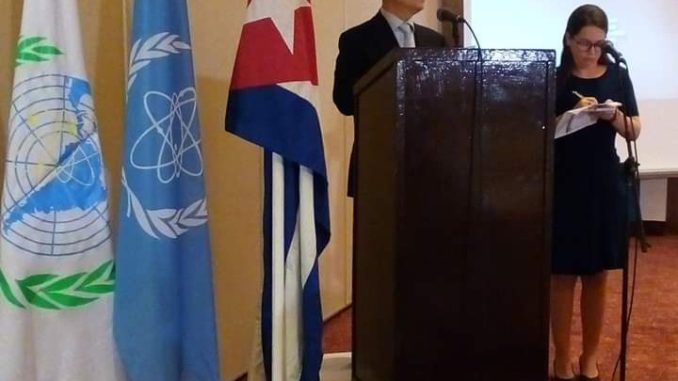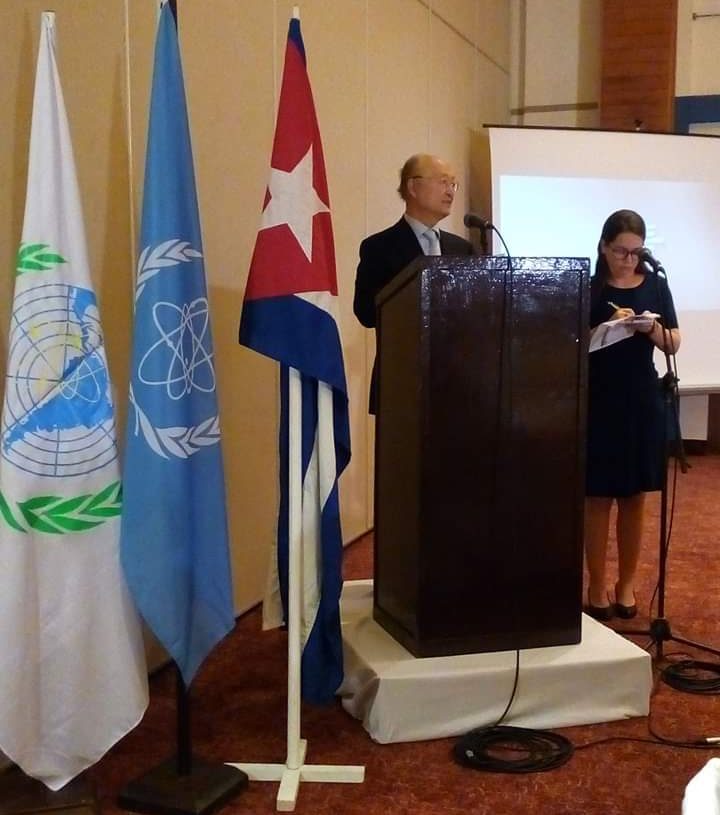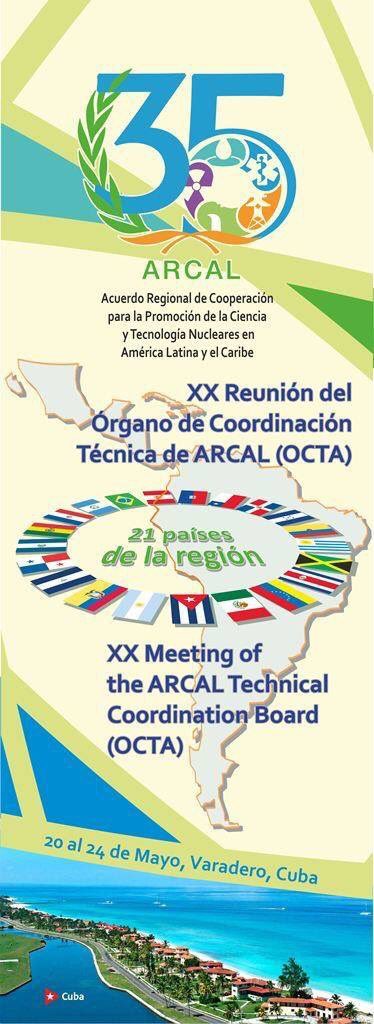IAEA meeting on nuclear techniques held in Cuba

The meeting is attended by Yukiya Amano, director of the International Atomic Energy Agency.
Yukiya Amano, Director General of the UN International Atomic Energy Agency (IAEA), inaugurated the 20th Meeting of the ARCAL (Regional Cooperation Agreement for the Promotion of Nuclear Science and Technology in Latin America and the Caribbean) Technical Coordination Board (OCTA).
The sessions will be extended until next Friday at the Meliá Marina Varadero Hotel, according to the Cuban News Agency.
Cuba will take over the Presidency of ARCAL, whose Representatives Organ (ORA) will be headed by Deputy Minister of Science, Technology and Environment José Fidel Santana Núñez; while the OCTA will be headed by Daniel López Aldama, president of the Nuclear Energy and Advanced Technologies Agency.
ARCAL is an intergovernmental agreement for horizontal, technical and economic cooperation aimed at promoting the peaceful use of nuclear technologies.
This agency, created in 1984, includes countries such as Argentina, Belize, Bolivia, Brazil, Chile, Colombia, Costa Rica, Cuba, Ecuador, Dominican Republic, El Salvador, Guatemala, Honduras, Jamaica, Mexico, Nicaragua, Panama, Paraguay, Peru, Uruguay and Venezuela.
Cuba joined the ARCAL Program in 1988. In March 1997, the ARCAL Meeting of the Highest Nuclear Authorities was held in Havana, where an institutional agreement passed on to become an intergovernmental one. In 2003 and 2007, two international events related to ARCAL were carried out on the island.
On May 17, President Díaz-Canel received Yukiya Amano in Havana and during the meeting he reaffirmed Cuba’s readiness and willingness to continue its close cooperation with the IAEA.
Díaz-Canel acknowledged the IAEA’s support to help Cuba in the application of new nuclear techniques in health care, particularly in the fight against cancer, one of the main causes of death in the country.
Amano visited the CIMEQ Hospital in the capital in recent days and received information there on the progress of a cyclotron facility, supported by the IAEA, used for the diagnosis and treatment of cancer and other non-transmissible diseases.
The support provided to Cuba in the irradiation of food and in the fight against diseases transmitted by mosquitoes, such as zika, dengue and chikungunya, with the use of the sterile insect technique, “an eco-friendly technology that that uses irradiation to control insects,” was also highlighted, according to World Nuclear News.
Cuba does not have operating nuclear power plants or research reactors. In 2000, Cuba and Russia definitively abandoned the project to install an electronuclear power plant in Juraguá, Cienfuegos.
In September 2016, the Russian state-owned nuclear corporation, Rosatom, signed an agreement with Cuba to create “the legal framework for greater bilateral cooperation in the field of civil nuclear energy.”
This agreement covers the fields of medicine and radiation technology; training of nuclear specialists; fundamental and applied research, [and] radioactive waste management.
Last April, Cuba and Russia signed another agreement to increase their cooperation on irradiation technologies and the production of isotopes through the creation of scientific-productive complexes linked to agriculture and health, according to the Cuban Nuclear Energy and Advanced Technologies Agency (AENTA).
Source: IAEA meeting on nuclear techniques held in Cuba | OnCuba News – English
 The meeting is attended by Yukiya Amano, director of the International Atomic Energy Agency.
Yukiya Amano, Director General of the UN International Atomic Energy Agency (IAEA), inaugurated the 20th Meeting of the ARCAL (Regional Cooperation Agreement for the Promotion of Nuclear Science and Technology in Latin America and the Caribbean) Technical Coordination Board (OCTA).
The sessions will be extended until next Friday at the Meliá Marina Varadero Hotel, according to the Cuban News Agency.
Cuba will take over the Presidency of ARCAL, whose Representatives Organ (ORA) will be headed by Deputy Minister of Science, Technology and Environment José Fidel Santana Núñez; while the OCTA will be headed by Daniel López Aldama, president of the Nuclear Energy and Advanced Technologies Agency.
ARCAL is an intergovernmental agreement for horizontal, technical and economic cooperation aimed at promoting the peaceful use of nuclear technologies.
The meeting is attended by Yukiya Amano, director of the International Atomic Energy Agency.
Yukiya Amano, Director General of the UN International Atomic Energy Agency (IAEA), inaugurated the 20th Meeting of the ARCAL (Regional Cooperation Agreement for the Promotion of Nuclear Science and Technology in Latin America and the Caribbean) Technical Coordination Board (OCTA).
The sessions will be extended until next Friday at the Meliá Marina Varadero Hotel, according to the Cuban News Agency.
Cuba will take over the Presidency of ARCAL, whose Representatives Organ (ORA) will be headed by Deputy Minister of Science, Technology and Environment José Fidel Santana Núñez; while the OCTA will be headed by Daniel López Aldama, president of the Nuclear Energy and Advanced Technologies Agency.
ARCAL is an intergovernmental agreement for horizontal, technical and economic cooperation aimed at promoting the peaceful use of nuclear technologies.
 This agency, created in 1984, includes countries such as Argentina, Belize, Bolivia, Brazil, Chile, Colombia, Costa Rica, Cuba, Ecuador, Dominican Republic, El Salvador, Guatemala, Honduras, Jamaica, Mexico, Nicaragua, Panama, Paraguay, Peru, Uruguay and Venezuela.
Cuba joined the ARCAL Program in 1988. In March 1997, the ARCAL Meeting of the Highest Nuclear Authorities was held in Havana, where an institutional agreement passed on to become an intergovernmental one. In 2003 and 2007, two international events related to ARCAL were carried out on the island.
On May 17, President Díaz-Canel received Yukiya Amano in Havana and during the meeting he reaffirmed Cuba’s readiness and willingness to continue its close cooperation with the IAEA.
Díaz-Canel acknowledged the IAEA’s support to help Cuba in the application of new nuclear techniques in health care, particularly in the fight against cancer, one of the main causes of death in the country.
Amano visited the CIMEQ Hospital in the capital in recent days and received information there on the progress of a cyclotron facility, supported by the IAEA, used for the diagnosis and treatment of cancer and other non-transmissible diseases.
The support provided to Cuba in the irradiation of food and in the fight against diseases transmitted by mosquitoes, such as zika, dengue and chikungunya, with the use of the sterile insect technique, “an eco-friendly technology that that uses irradiation to control insects,” was also highlighted, according to World Nuclear News.
This agency, created in 1984, includes countries such as Argentina, Belize, Bolivia, Brazil, Chile, Colombia, Costa Rica, Cuba, Ecuador, Dominican Republic, El Salvador, Guatemala, Honduras, Jamaica, Mexico, Nicaragua, Panama, Paraguay, Peru, Uruguay and Venezuela.
Cuba joined the ARCAL Program in 1988. In March 1997, the ARCAL Meeting of the Highest Nuclear Authorities was held in Havana, where an institutional agreement passed on to become an intergovernmental one. In 2003 and 2007, two international events related to ARCAL were carried out on the island.
On May 17, President Díaz-Canel received Yukiya Amano in Havana and during the meeting he reaffirmed Cuba’s readiness and willingness to continue its close cooperation with the IAEA.
Díaz-Canel acknowledged the IAEA’s support to help Cuba in the application of new nuclear techniques in health care, particularly in the fight against cancer, one of the main causes of death in the country.
Amano visited the CIMEQ Hospital in the capital in recent days and received information there on the progress of a cyclotron facility, supported by the IAEA, used for the diagnosis and treatment of cancer and other non-transmissible diseases.
The support provided to Cuba in the irradiation of food and in the fight against diseases transmitted by mosquitoes, such as zika, dengue and chikungunya, with the use of the sterile insect technique, “an eco-friendly technology that that uses irradiation to control insects,” was also highlighted, according to World Nuclear News.

Leave a Reply